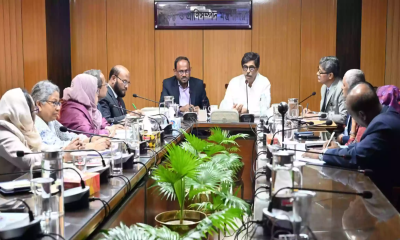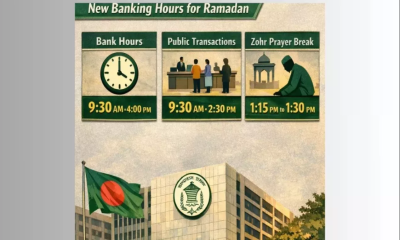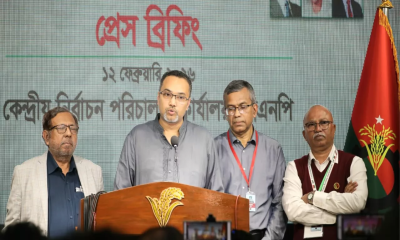Iranians are voting on Friday to replace the late President Ebrahim Raisi, who was killed in a May helicopter crash in the country`s northwest along with the foreign minister and several other officials.
Analysts broadly describe the race as a three-way contest. There are two hard-liners, former nuclear negotiator Saeed Jalili and the parliament speaker, Mohammad Bagher Qalibaf. Then there’s the reformist candidate Masoud Pezeshkian, who has aligned himself with those seeking a return to the 2015 nuclear deal with world powers.
After record-low turnout in recent elections, it remains unclear how many Iranians will take part in Friday’s poll.
While 85-year-old Supreme Leader Ayatollah Ali Khamenei has final say on all matters of state, presidents can bend Iran toward confrontation or negotiations with the West.
Sole reform candidate says he`ll seek better ties `with all countries except Israel’
The sole reformist running in Iran’s presidential election told journalists after voting: “God willing, we will try to have friendly relations with all countries except Israel.”
The remark by Masoud Pezeshkian, a 69-year-old heart surgeon who seeks a return to the atomic accord and better relations with the West, came after he faced a thinly veiled warning from Iran’s Supreme Leader Ayatollah Ali Khamenei over his outreach to the United States.
With the comment, Pezeshkian signals his effort to energize those who want more engagement with the West after the collapse of the country’s 2015 nuclear deal with world powers. However, close ties to the West — particularly the U.S. — would be anathema to the hard-liners he faces.
In Iraq, Iranian workers, pilgrims and prisoners cast votes abroad
BAGHDAD — Iranian residents of Iraq and pilgrims visiting Shiite religious shrines cast votes Friday at the country’s six Iranian consulates in federal Iraq and the semi-autonomous Kurdish region in the north, and at mobile voting stations in other areas of the country.
“We have fixed centers, consulates and mobile polling stations that go to (Iranian) workers in companies operating in Iraq,” said Mohammad Kazem Al-Sadegh, Iran’s ambassador to Iraq. “Even some prisoners who are present have coordinated with the government so that they can cast their votes. The electoral process will go smoothly today, God willing.”
Baghdad has close relations with Tehran, and current Prime Minister Mohammed Shia al-Sudani came to power with the support of a coalition of pro-Iran factions. At the same time, Iraq has attempted to maintain good economic and military relations with Washington.
That balance has become increasingly difficult over the past nine months against the backdrop of the Israel-Hamas war in Gaza. Iranian-backed Iraqi militias have launched drone attacks against U.S. bases in Iraq and Syria and targets in Israel.
The only cleric in the race is accused of violating human rights and promises change in foreign policy
Candidate Mostafa Pourmohammadi, the only Shiite cleric running, cast his vote in Tehran and expressed hope for high turnout.
Pourmohammadi, who served as interior minister under hard-line President Mahmoud Ahmadinejad and later as justice minister under relative moderate President Hassan Rouhani, said “We hope that our people turn today into one of the best days in their history with a good choice and high turnout."
In 2006, the United States State Department declared Pourmohammadi a “notorious human rights violator,” accusing him of playing a leading role in the mass execution of several thousand political prisoners at Tehran’s notorious Evin prison in 1988. The State Department also linked him to the so-called “chain murders” of activists and others in the 1990s.
He’s insisted the next president must deal with the world and criticized Iran’s arming of Russia in the war in Ukraine — not because the weapons are used to kill of civilians, but because he felt Tehran isn`t getting enough back from Moscow for its support.
His campaign is likely counting on the backing of clerics and traditionalists.
With turnout still unclear, more voters share their thoughts
As Iranian state TV showed people lined up to vote, most of the polling stations The Associated Press visited in early hours of voting — mostly on the north side of Tehran — were not crowded.
Mahmoud Darrehei, a 49-year-old teacher, said he voted for heart surgeon Masoud Pezeshkian, the only reformist candidate in the race. “This is the first time I`ve voted since 2005," adding that he saw Pezeshkian as able to solve problems caused by years of hard-line governments.
At another polling station, Maryam Aalipour, 32, a mother of two clad head-to-toe in a black veil, said she voted for hard-line former nuclear negotiator Saeed Jalili. “He is the cleanest candidate in the election. He knows all problems of the country and he is able to resist the U.S. pressures," she said.
Aria Rahimi, a 37-year-old who runs in a shop in Tehran`s upmarket Mandela Street, said he voted for Mohammad Bagher Qalibaf, the speaker of parliament. “I voted for Qalibaf before opening the shop," he said. "We need a president who has experience in managing some important body like parliament or police. Qalibaf is the best among them in this regard."
Iranian voters speak
As voters cast ballots in Iran’s presidential election, some are sharing their thoughts with The Associated Press.
Toosi, who gave only his first name, said he would cast his ballot for someone “who listens to the leader, is revolutionary and is loyal to the principles of the revolution.”
"Someone who’s not focused on the West, but focusing on our domestic capacities, on our youth," he added. “Someone who is obsessed about the people and has plans for future and has a very good track record.”
Toosi’s comments tracked with what others supporting a hard-line view have said in the campaign.
Another voter, who gave his name as Ghoochian, said he backed Masoud Pezeshkian, the race’s sole reformist candidate.
“I’ve know him for years,” the man said. “His stances, honesty and wholesomeness make him the best option. That’s why I voted for him.”
Reformist ex-foreign minister says voting is the answer to hard-liners
A former Iranian foreign minister who reached the 2015 nuclear deal with world powers has offered a positive assessment of the chances of the sole reformist candidate in Iran’s presidential election.
Mohammad Javad Zarif spoke Friday at a polling station in Tehran after casting his ballot. Zarif has been a key advocate for the heart surgeon Masoud Pezeshkian, who faces three hard-liners in the election.
“Hopefully, people will go and choose for themselves, and hopefully, if there is a large turnout, it will become clear who is the majority and who is the minority,” Zarif said.
Zarif also quoted what he said was a foreign proverb abroad, that bad politicians are elected by good people who do not vote. “Now is an opportunity to vote,” he added.
Zarif and Pezeshkian received a thinly veiled warning from Supreme Leader Ayatollah Ali Khamenei earlier in the week over their desire to negotiate with the West, particularly the United States.
Iran`s acting president says he has no security concerns about vote
Iran’s acting president Mohammad Mokhber has cast his vote and said that there are no security concerns in election.
“We have no security concerns for the elections,” Mokhber said in comments aired by state television. “The polling stations and its branches are properly placed in such a way that there is no point in the country or even outside the country where voting is not possible.”
Mokhber has served as acting president in the wake of the May helicopter crash that killed President Ebrahim Raisi. He was Raisi’s first vice president, but did not apply to run in the election.
Supreme leader calls for public to vote
Iran’s supreme leader called on the public to vote in the snap election to replace hard-line President Ebrahim Raisi, who died in a helicopter crash in May.
Ayatollah Ali Khamenei gave brief remarks Friday, speaking to journalists gathered in Tehran to cover him voting.
“I don’t see any reason for doubt,” Khamenei said at the ceremony in a mosque attached to his offices.
Khamenei said a high turnout was a “definite need” for the Islamic Republic. He also called the election an “important political test.”
Raisi, 63, had been seen as a protégé of Khamenei and a possible successor for the supreme leader position in Iran, which has final say over all matters of state in the Shiite theocracy.
How does Iran vote?
Any Iranian 18 or older can vote in Friday’s election. There are 58,640 polling centers around the country, set up in mosques, schools and other public buildings. A voter first needs to show their national ID card and fill out a form. They then dip an index fingers in ink, making a print on the form, while officials stamp their ID so they can’t vote twice. On the secret ballot, a voter writes down the name and the numerical code of the candidate they are voting for and drops it into a ballot box. Voting lasts from 8 a.m. until 6 p.m., though authorities routinely keep polls open at least several hours later.
What power does an Iranian president have?
Iranian presidents serve four-year terms and are limited to serving two terms. Iran’s president is subordinate to the supreme leader and over the recent years, the supreme leader’s power appears to have grown stronger amid tensions with the West. However, a president can bend the state’s policies on both domestic issue and foreign affairs. Former President Hassan Rouhani, for example, struck the 2015 nuclear deal with world powers with the blessing of Supreme Leader Ayatollah Ali Khamenei. The hard-line tact taken by the late President Ebrahim Raisi also had Khamenei’s backing.
How is Iran ruled?
Iran describes itself as an Islamic Republic. The Shiite theocracy holds elections and has elected representatives passing laws and governing on behalf of its people. However, the supreme leader has the final say on all state matters and the Guardian Council must approve all laws passed by the parliament. Those who led Iran’s Green Movement after hard-line President Mahmoud Ahmadinejad’s disputed 2009 re-election remain under house arrest. Security forces answering only to the supreme leader also routinely arrest dual nationals and foreigners, using them as pawns in international negotiations. Mass protests in recent years have seen bloody crackdowns on dissent. Meanwhile, hard-liners now hold all levers of power within the country. The Guardian Council approves all candidates and also has never allowed a woman to run for president. It routinely rejects candidates calling for dramatic reform, stifling change.


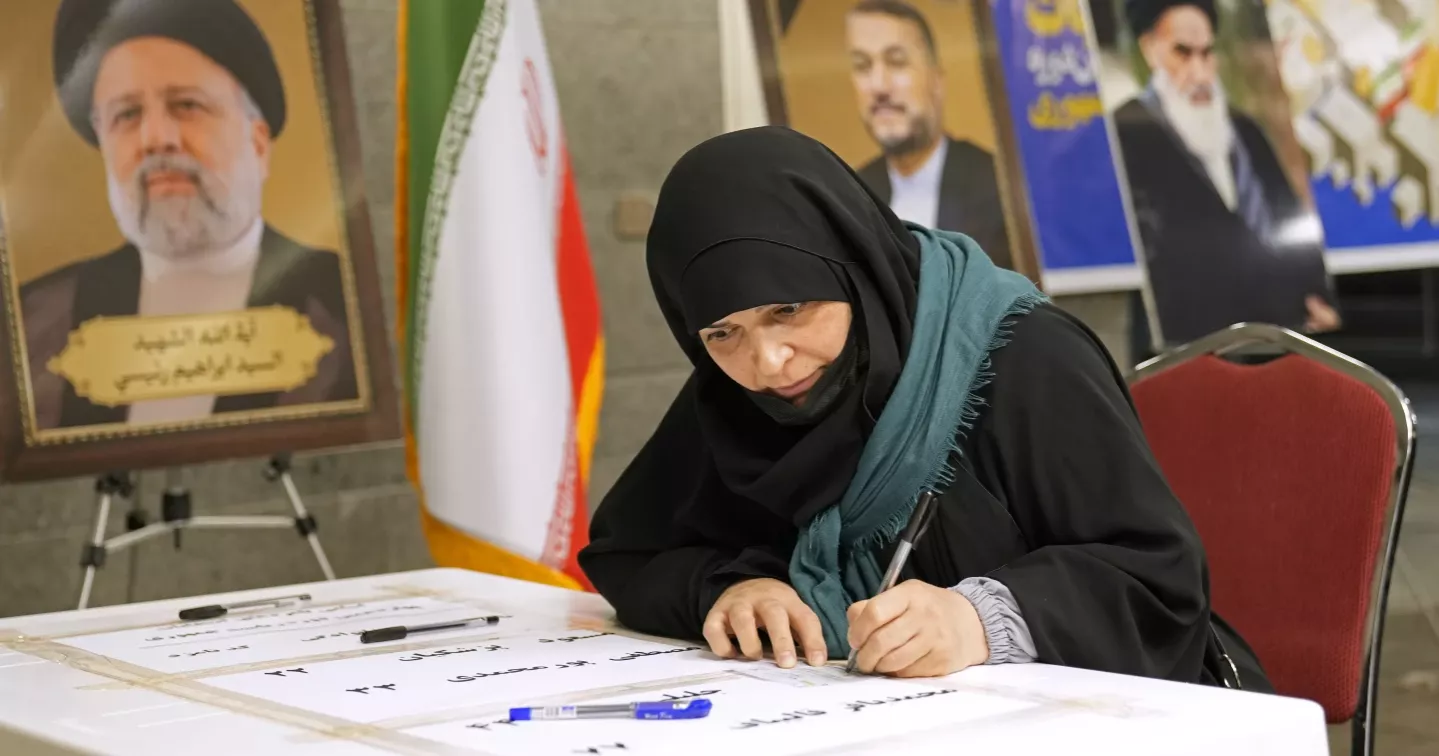

-20260219110716.webp)
-20260219054530.webp)
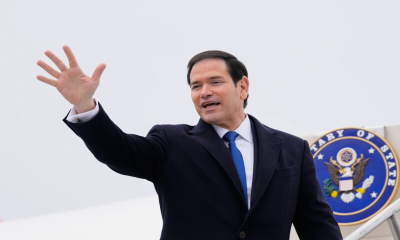
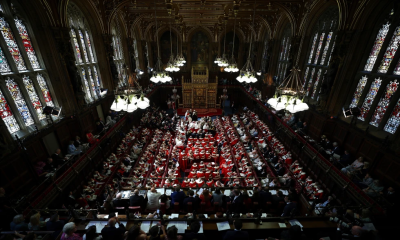
-20260218060047.jpeg)
-20260216055149.webp)



